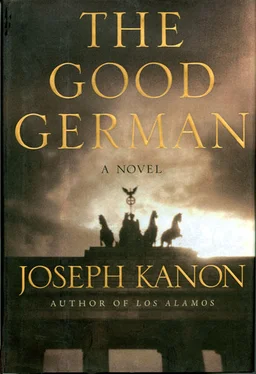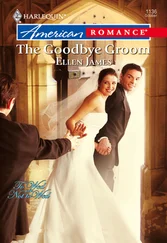Jake had never spent much time in Dahlem, whose quiet streets, away from the center, reminded him of Hampstead, but the relief of seeing houses standing, with their traditional tile roofs and brass knockers, made it seem more familiar than it was. Most of the win-dowpanes were still missing, but the street had been swept free of glass, tidied up, and the smell that had followed them through the city was finally gone, the bodies swept away too in the general house-cleaning.
The villa was a three-story pile of pale yellow stucco, not as lavish as the millionaire mansions up in Grunewald but substantial, the home probably of a professor from the Kaiser Wilhelm Institute a few streets away.
“I had to give the congressman the master bedroom,” Ron said, an innkeeper leading them up the stairs, “but at least you won’t have to double up. I can switch you later,” he said to Liz. “He’s only here a few days.”
“Hit and run, huh?” Liz said.
“Nobody stays for long, except the MG personnel. They’re all on the second floor. One more flight. Dinner’s at seven, by the way.”
“Where do the enlisted men stay?”
“All over. Mostly barracks down in the old Telefunken factory. Some over by Onkel Toms Hutte,” he said, pronouncing it in English.
“Uncle Tom’s Hut?” Liz said, amused. “Since when?”
“Since always. Their name. They like the book, I guess.”
Jake’s room must have belonged to the daughter of the house. There was a single bed with a pink chenille spread, floral wallpaper, and a vanity with a round mirror and pink ruffled skirt. Even the blackout drapes had been backed with pink fabric.
“Sweet.”
“Yeah, well,” Ron said. “Like I said, we can switch around in a few days.”
“Never mind. I’ll just think virginal thoughts.”
Ron grinned. “That’s one thing you won’t have to worry about in Berlin.” He turned to the door. “Just leave any laundry on the chair. They’ll pick it up later.” And then, with a click, he was gone, taking his breeze with him.
Jake stared at the frilly room. They who? A house staff to fetch and carry, one of the spoils of victory. What had happened to the girl, requisitioned out of her pink cocoon? He walked over to the glass-topped vanity. A trace of powder, but otherwise cleared off, all the jars and tubes swept into some case on the way out. Idly he opened the drawers, empty except for a few publicity stills of Viktor Staal with pinholes in the corners, presumably no longer her dreamboat. But at least she’d had a room to leave. What about Lena? Did she pack her perfume bottles and compacts and get out in time, lucky, or linger until the roof caved in?
He lit a cigarette and walked over to the window, unbuttoning his shirt. The yard below had been dug up to make a vegetable garden, but the rows had become a muddy tangle, tramped over, he supposed, by the Russians foraging for food. Still, you could breathe here. The wounded city, just a few miles away, had already begun to fade, hidden by the trees and suburban houses, the way an anesthetic blotted up pain. He should have taken notes. But what was there to say? The story had already happened. From the looks of it, building by building, old men and teenagers sniping from doorways. Why had they held out? Waiting for the Americans, he’d heard. Anyone but the Russians. The peace will be worse — Goebbels’ last warning, the only one that came true. So, the final madness. Whole streets on fire. There’d been roving packs of SS, hanging boys from lampposts as deserters. To make an example. In the camps they’d killed people right up to the last hour. Here they’d even turned on their own. Not war anymore, a bloodlust.
Jake hadn’t filed a real story in two months, not since the camps; he had been waiting for Berlin. Now he felt that Berlin would defeat him too, that all the copy would end in Ron’s lunar landscapes and decayed teeth, inadequate attempts at scale. He had run out of words. personalize it. Not the thousands, just one. She’d be here. It wasn’t too much to hope for, one survivor. He looked again at the garden. Near a shed in the back, a gray-haired woman was hanging wet clothes over an improvised line of rope. A hausfrau.
“But what are you going to do?” he’d said. “Come with me. I’ll arrange it. I’ll get you out.”
“Out,” she said, dismissing it, the word itself improbable. Then she shook her head. “No, it’s better.” She’d been sitting at her dressing table, still in her slip, perfectly made-up again, her nails red. “I’ll be a hausfrau,” she’d said almost casually, putting on lipstick. “A good German hausfrau.” She lowered her eyes. “Not this, all the lies.”
“They’re not lies,” he’d said, putting his hands on her shoulders.
She looked up at his face in the mirror. “The lies to him.”
Down below, the gray-haired woman had spotted him in the window. She hesitated, then nodded in a servant’s bow and picked up the wicker basket. He watched her cross the muddy yard. Personalize it. What had her war been like? Maybe she’d been one of the faithful, shouting her lungs out at the Sportpalast, now doing laundry for the enemy. Or maybe just a hausfrau, lucky to be alive. He crossed over to the bed, dropping his shirt. What did it matter either way? Losers’ stories. Back home they’d want the glamour of the conference, Truman horse-trading with Stalin, the great world they’d won, not the rubble and the people in the Tiergarten with the future knocked out of them.
He took off the rest of his clothes and wrapped a towel around his waist. The bathroom was at the end of the hall, and he opened the door to a rush of steam and a surprised yelp.
“Oh.”
Liz was in the tub, her breasts barely clearing the soapy water, wet hair swept back from her face.
“Don’t you knock?”
“Sorry, I—” he said, but he didn’t move, watching her slide down into the tub, covering herself, her flesh as pink as the vanity ruffle.
“Have a good look?”
“Sorry,” he said again, embarrassed. A soft woman’s body, without the uniform and gun holster, now hanging on a peg.
“Never mind,” she said, smiling, a veteran of shared tents and field latrines. “Just keep your towel on. I’ll be out in a sec.”
She plunged her head into the water to rinse, then smoothed her hair back and reached for a towel.
“You going to turn around, or do you want the floor show too?”
He turned his back to her as she stepped out. A splash of water and a rustling of cloth, the sounds themselves intimate.
“I suppose I should take it as a compliment,” she said, wrapping herself in a robe. “You never noticed before.”
“Sure I did,” he said, his back to her.
“Uh-huh.” He could hear the water running down the drain in gulps. “Okay, decent.”
She was in a silk wrapper, toweling her hair. He looked at her, then cocked his head like the young GI at the Chancellery.
“How about I buy you a drink later?”
“With my clothes on? Can’t. I’m busy.”
“That was fast. Not young Ron?”
She grinned. “I wouldn’t have the strength.” She fixed the towel around her head in a turban. “Just business. Have to see a man about a duck. I’ll take a rain check, though.” She nodded at the tub. “Better run your water. It takes a while.” She gathered her things slowly from the stool, then sat down.
“Are you staying?”
“Jake? Tell me something. That business this afternoon-who was she?”
“Why a she?”
“Because it was. What’s the story? You know I’ll get it out of you eventually.”
“No story,” he said, turning on the taps. “She went back to her husband.”
“Oh,” she said, “that kind of story. She left you?”
Читать дальше












